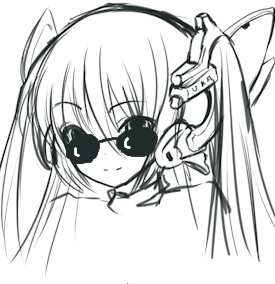
Written by A. H. on 10 May 2009
Distributor University of Minnesota Press • Author/Artist Hiroki Azuma • Price £11.00
While most of us watch anime and read manga primarily as a source of entertainment, there are some of us that like to take a look beyond that surface entertainment value at times to investigate both the medium and Japanese culture as a wider entity. If you're the kind of person who likes to deconstruct the series they read and watch at this deeper level, then Otaku: Japan's Database Animals may well be of interest to you.
Broadly speaking, and as its title suggests, the focus of Hiroki Azuma's book is on the subject of "otaku" - A Japanese term that has enjoyed a fluctuating meaning and reputation since it was first coined. After starting out as a catch-all term for an obsessive enthusiast of any kind, the word eventually gained negative connotations as a result of a series of murders of young girls carried out by a man labelled by the media as an "otaku", before the mid-1990s and onward have seen a generation of otaku try to reclaim the word for themselves, imbuing it with at least a slightly more positive meaning which remains to this day.
However, Azuma's work is largely unconcerned with the reputation of the word "otaku", using it instead simply to denote his subject matter as the hardcore fans of anime, manga and the other media which makes up this particular part of Japanese subculture. In particular, Azuma looks to examine the worldview of otaku through the concept of post-modernism, an "end of history" of sorts widely discussed in philosophical circles and generally taken to mean a world bereft of any civil or external wars of any true note. In essence, Azuma's key assertion is that this post-modern world has also seen the death of the "grand narrative", a "big picture" if you like that holds over a populace such as a large-scale war or a doctrine such as Communism, and that the death of such narratives has seen a massive change in the way people consume their culture, with otaku appearing to lead this change.
If all of this sounds like extremely deep and heavy-going stuff, then I'd suggest trying not to be too put off by such grandiose concepts, as once Azuma's own meaning of terms such as post-modernism and the concept of a grand narrative is established, then the book returns to a generally more comfortable and accessible style, making excellent and extensive use of anime and visual novels to make some really quite compelling points on the change both to the way otaku consume their preferred subculture, and in turn how those media have changed to incorporate and "exploit" this shift in the consumption "model" of the otaku. So, we have an in-depth discussion of how Di Gi Charat is a near perfect example of the new "database model" of cultural consumption, while the universes occupied by Gundam and Neon Genesis Evangelion respectively are used to outline the shift from anime and manga characters occupying a single coherent universe at all times to one where those characters can step outside in to any universe of a content creator's choosing without raising a single eyebrow amidst the fans of that franchise.
Of course, all of these points and theories are simply the opinions of the author at the end of the day, leaving us with ample room for debate (indeed, the point surrounding the transition from a Gundam to Evangelion-esque model of narrative can be argued by the fact that the Gundam franchise, and others like it such as Macross, are still going strong), but there can be no denying that most if not all of the thoughts laid down by the author are both well researched, thought-out and explained, making Otaku: Japan's Database Animals a worthy read even if you find yourself disagreeing with some of his positions.
Overall then, Otaku: Japan's Database Animals is a definite must-read for anyone who wants to delve deeper into the thought processes behind both modern-day anime and manga producers as well as the fans of that content, while also examining how the requirements and expectations of otaku have changed and evolved over several decades. As books go, and in keeping with its status as a philosophical paper of sorts, it certainly shouldn't be regarded as light reading and does assume an understanding of certain terms such as "moe", but by the same token Azuma's dry yet expansive style (coupled with a top-notch English translation) does an excellent job of clearly and concisely explaining his thought processes and how he has reached the conclusions on show in the book. Be warned though, chances are you won't look at a lot of modern anime in quite the same way after reading this book and taking into account the author's theories.

Author: A. H.
posted by Eoghan O'Connell on 25 Nov 2025
posted by Ross Locksley on 06 Nov 2025
posted by Eoghan O'Connell on 05 Nov 2025
posted by Ross Locksley on 21 Oct 2025
posted by Eoghan O'Connell on 18 Oct 2025
posted by Ross Locksley on 26 Sep 2025
posted by Eoghan O'Connell on 23 Sep 2025
posted by Ross Locksley on 16 Sep 2025